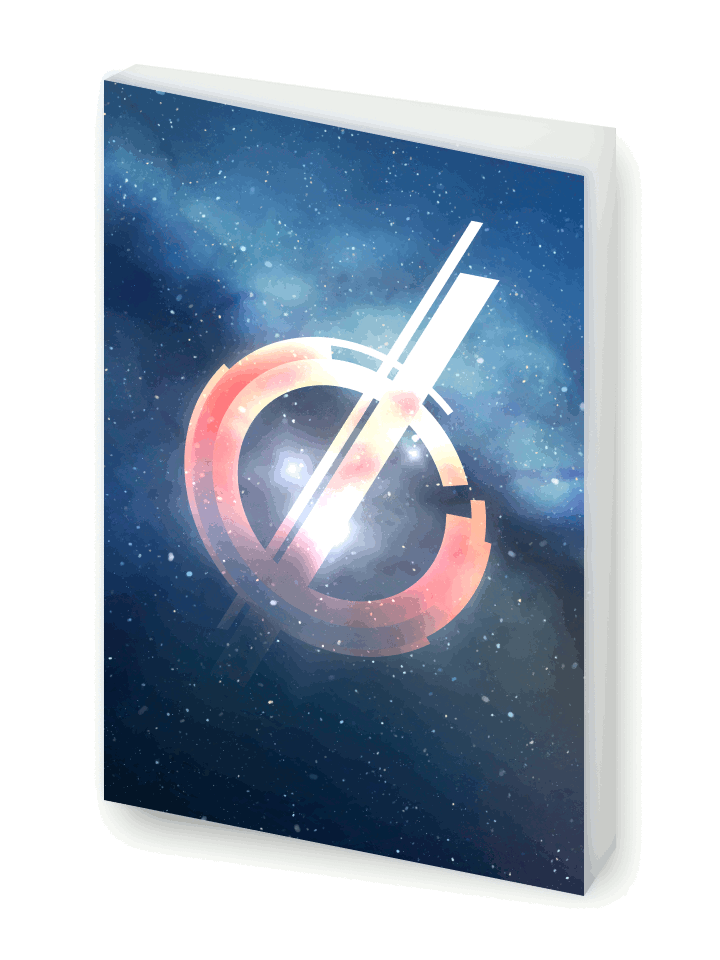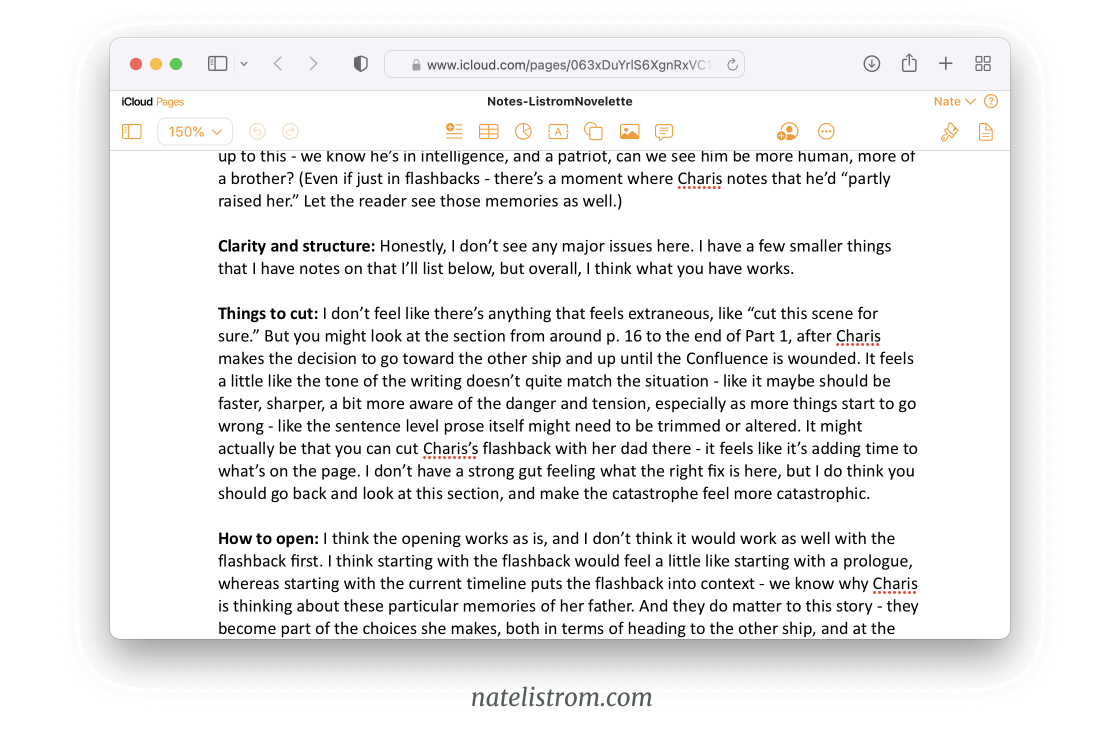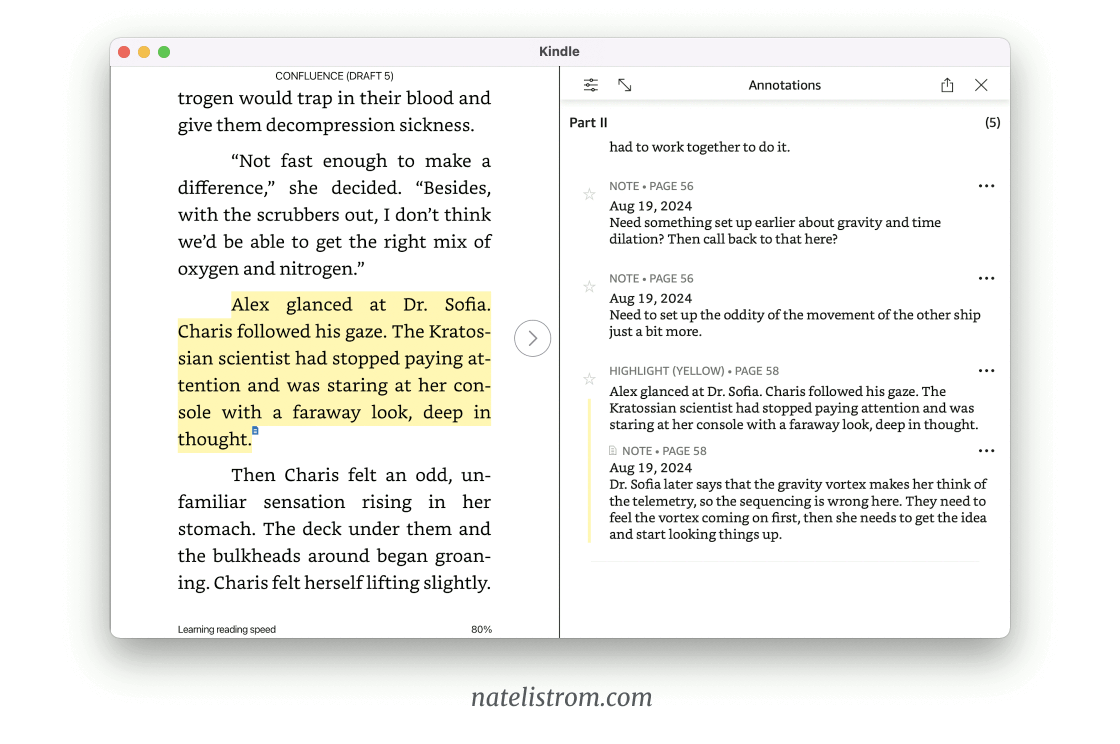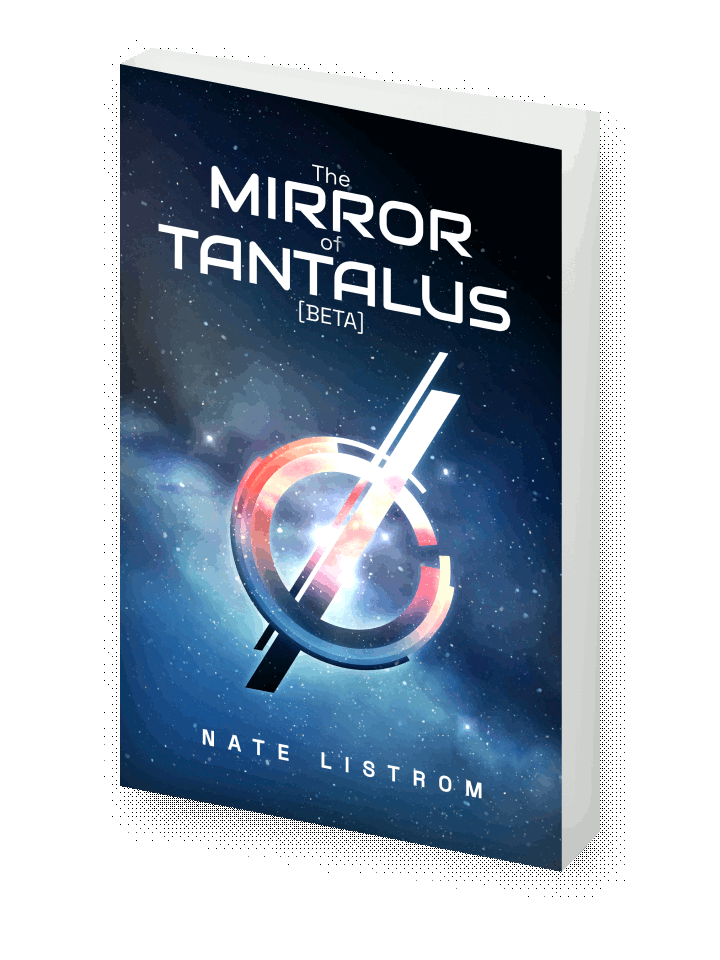Working with an editor: The making of ‘The Mirror of Tantalus’ (part four)
Summary: The story of me sending the fourth draft of my novelette, ‘The Mirror of Tantalus’ to an editor, working through changes based on her feedback, and further revising with other modalities

This is the fourth note in a little “making of” series about the development of my novelette, The Mirror of Tantalus. I love listening to artists talk about how they developed their work. You can learn so much from the chronicle of the ups and downs, the false starts and dead-ends, the discoveries made along the way. Hopefully, hearing a bit of my journey will be useful to you on yours.
In the previous note, I talked about how I revised Tantalus and wrestled with what to do about exposition. In this note, I’ll talk about the working with an editor.
Getting an outside opinion (Jul 2024)
I’ve worked with one particular freelance editor a couple of times in the past. She’s fantastic. She does an excellent job with the specific kind of story development feedback I needed for Tantalus: big picture, what’s working and what needs to be improved?
So, I reached out to her. We agreed on a schedule and price, and I sent off my manuscript.
Then I waited with bated breath.
I liked the story. I believed in it. But how close was it to being ready? Did it still have major problems? How much work would be left?
Thankfully, when she got back to me, she said the story as a whole was working. She didn’t suggest any major surgeries that would send the story back into months of rewrites.
However, she did give me some really useful notes. A couple of them resulted in edits that are worth mentioning.

Exposition for clarity
The first was that, gauging from her feedback, I wasn’t really giving enough exposition for things to be clear. In my zeal to cut exposition and avoid boring my readers, I’d gone too far. One thing, especially, was that I needed to better explain the conflict between the Kratossians and Areteans. So, I added back in some of the exposition I had removed, and I further refined things with some new material.
Pacing and escalation
The second piece of feedback was about escalation. In my notes to the editor, I’d asked for her to suggest if there were any things that I needed to trim. She said she didn’t think that was necessary, but she did mention Charis’ school-years flashbacks with her dad as something that could be cut if I wanted. It was causing the story to slow down right at the point when it needed instead to be building toward the inversion. To her, things needed to feel more climactic.
I looked closely at what was happening in the story. I didn’t want to cut the flashback, because it gave us Charis’ dad’s perspective on perseverance. I felt that was valuable for Charis’ story. It influences how she pilots the Confluence during the worst of the turbulence and also how she needs to press on through the final conflict with Alex.
But the editor was absolutely right that the build toward the inversion was fizzling instead of sizzling. I initially diagnosed this as a pacing problem. I needed more material in the final build up to the inversion. It was too brief.
That’s technically true. I did need more material. However, on reflection, I think my specific diagnosis was wrong. The problem wasn’t as much about pacing as it was about escalation.
Leading up to the midpoint, there are three waves of vortices. The Confluence gets inverted on the third wave. In the draft the editor saw, there was more story material in the second wave than the third. While this (together with the flashback) did affect pace, the more significant effect was to make the second wave feel more intense than the third.
The fix was to move some of that material out of the second wave and push it into the third. That made the third wave feel more intense, which is what the story needed. Once that was done, I felt that the pacing and escalation made more sense. The story moved in the right direction. And best of all, I could keep the flashback.
Draft five (Jul - Sep 2024)
After fixing the exposition and escalation as best I could, I regarded the broad arc of the story as more-or-less successful. I could trust the structure and start working on line edits. Active work on the fifth draft started in July of 2024 and ran through to September.
Here, I switched modalities again. I exported the story to my Kindle app. I used my phone’s accessibility features to read the story aloud to me. That way, I could hopefully catch typos or odd phrasing that I’d miss if I were just reading it normally. I highlighted a handful of things that felt rough. This gave me a “punch list” of edits to make.

Once I’d fixed everything on that list, I did one more pass reading the story aloud and making fixes to awkward wording so that it read a bit better.
Finally, I also took the opportunity to tighten up some other minor details that went beyond wording and phrasing.
For example, in the draft that went to the editor, Alex uses a pair of scissors to cut the leg of Charis’ flight suit so that he can inspect her wounded leg. Then, later, he uses those same scissors to stab Dr. Sofia. To me, the attack felt more visceral because he used a nonstandard weapon.
But I realized it didn’t make logical sense. Charis has a knife in her hip pocket — and she’s an ordinary Aretean civilian. If she has a weapon on her, then certainly Alex, a trained paramilitary operator, would have his own field knife. He’d be adept at using it. So, it would make more sense for him to whip that out and use it to cut the flightsuit instead of waiting for scissors.
For the sake of believability, I cut out the scissors. (Yes, that’s a pun. Sorry.)
By the end of this process, I felt the story was ready for broader feedback. I packaged it up as a “beta” version (the same one you see here on my site) and decided to publish it to various channels where I could get people to read it and tell me what they thought.
In the next note, I’ll talk a bit about naming, which always seems to be a particular challenge for me.
Onward!
You (yes, you!) can help
I need your feedback to make the story better.
First, read The Mirror of Tantalus
The Mirror of Tantalus (Beta)
17K words | 2hr reading timeWhen a strange interstellar object enters Earth’s system, Charis Samogost joins an unlikely alliance of nations sent to investigate. As they draw nearer to their goal, loyalties are tested, and Charis must decide what’s most important to her . . . and what she’s willing to do to get it.
After that, fill out a 5 min feedback form →
. . . And thank you for being here and catching up with my little journey.
Rate this note
Get free updates
Thoughtful insights on storytelling, published the first Tuesday of each month.
